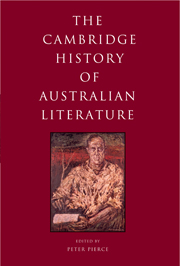Book contents
- Frontmatter
- Introduction
- FROM EUROPEAN IMAGININGS OF AUSTRALIA TO THE END OF THE COLONIAL PERIOD
- FROM THE LATE NINETEENTH CENTURY TO 1950
- TRAVERSES
- FROM 1950 TO NEARLY NOW
- 17 Publishing, patronage and cultural politics: Institutional changes in the field of Australian literature from 1950
- 18 Theatre from 1950
- 19 The short story since 1950
- 20 Scribbling on the fringes: Post-1950 Australian poetry
- 21 Groups and mavericks
- 22 The challenge of the novel: Australian fiction since 1950
- 23 The novel, the implicated reader and Australian literary cultures, 1950–2008
- 24 Nation, literature, location
- Select bibliography
- Index
- References
21 - Groups and mavericks
from FROM 1950 TO NEARLY NOW
Published online by Cambridge University Press: 28 May 2011
- Frontmatter
- Introduction
- FROM EUROPEAN IMAGININGS OF AUSTRALIA TO THE END OF THE COLONIAL PERIOD
- FROM THE LATE NINETEENTH CENTURY TO 1950
- TRAVERSES
- FROM 1950 TO NEARLY NOW
- 17 Publishing, patronage and cultural politics: Institutional changes in the field of Australian literature from 1950
- 18 Theatre from 1950
- 19 The short story since 1950
- 20 Scribbling on the fringes: Post-1950 Australian poetry
- 21 Groups and mavericks
- 22 The challenge of the novel: Australian fiction since 1950
- 23 The novel, the implicated reader and Australian literary cultures, 1950–2008
- 24 Nation, literature, location
- Select bibliography
- Index
- References
Summary
Quarantined spaces, groups and a crisis of modernism
Australian poetry after World War II has been strangely isolated from other poetries in English. The usual arguments are that the war, with its massive influx of American troops and the expeditions of Australian soldiers overseas, broke up the intactness of Australian arts in the same way as happened with its economy and society. Similar arguments are made in the context of the Great War, but these are often more enthusiastic than factual. Reaching back further, though Australia is so physically isolated, especially prior to air travel, its post-settlement/invasion poetry has been seen as an extension of primarily European, particularly British–Irish poetries, in essence an ongoing colonial poetry.
I believe, however, that this is untrue. The isolation of Australian poetry and poetics has evolved more from choice than from circumstances, and its quality comes about from very specific relationships between a consciousness of the uniqueness of the Australian landscape, and the enormity of dispossessing Indigenous peoples whose relationship with that land is so specific, varied, and complex. This is not to say such conditions have not existed elsewhere, but Australia has been resistant to (if deeply troubled about) its place in the broader international community.
Even now, in an age of easy air travel and ready communications of diverse kinds, a reiteration of uniqueness and separateness still underlies much Australian writing. It seeks to set itself apart. And even in cases where anthologists try to be inclusive, or connect with other parts of the world, Australia is constantly defined as such a different space that connection must come through the migrant experience, economics, or other material exchange. An example is an anthology I recently co-edited with Alvin Pang, Over There, which juxtaposes contemporary Australian and contemporary Singaporean poets while keeping them in their respective country spaces.
- Type
- Chapter
- Information
- The Cambridge History of Australian Literature , pp. 473 - 497Publisher: Cambridge University PressPrint publication year: 2009
References
- 3
- Cited by



